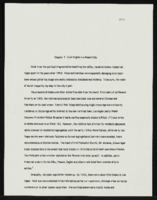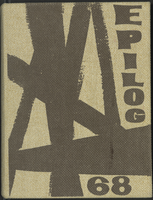Search the Special Collections and Archives Portal
Search Results

Transcript of interview with Marie Jordan by Danny Budak, March 20, 1978
Date
Archival Collection
Description
On March 20, 1978, collector Danny Budak interviewed the University of Nevada Las Vegas (UNLV) bookstore buyer, Marie Jordan (born June 26th, 1940 in Arizona) in the UNLV library. This interview offers Marie Jordan’s personal perspective of life in Nevada, being a local resident for twenty years. Marie also discusses family life and changes that she has witnessed in the Valley.
Text

Transcript of interview with Charlotte Conti by Charles Conti, March 20, 1978
Date
Archival Collection
Description
On March 20, 1978, Charles Conti interviewed hairdresser and physical education instructor of St. Francis School, Charlotte Conti (born Charlotte Anne Easton on December 13, 1941 in Arkansas) at her home in Las Vegas, Nevada. During the interview Charlotte discusses occupations, Mormon Church activity, education, marriage and raising a family in Las Vegas. She then recalls the social significance and communal impact of the annual Helldorado Parade. She also discusses the overall growth and development of Las Vegas, Nevada, from 1953 to 1978.
Text

John McKay interview, March 3, 1980: transcript
Date
Archival Collection
Description
On March 3, 1980, Donna Malloy interviewed John McKay (b. July 7th, 1926 in North Dakota) about his life in Las Vegas, Nevada. McKay begins by speaking about his family history, his career in the electronics and engineering field for aerospace, as well as his experiences in two wars. Moreover, McKay speaks about his hobbies of hunting and fishing and his time as a musician around Las Vegas. McKay also spends time going over how the city of Las Vegas has grown and changed, the increase in crime, and the extreme floods in the 1950s. Lastly, McKay talks about the Nuclear Test Site, how casino gaming chips were used as money around the city, how the city of Las Vegas started and the future of the valley.
Text

Transcript of interview with Lawrence Hadland by Lorraine Owens, February 2, 1979
Date
Archival Collection
Description
On February 2, 1979, collector Lorraine Owens interviewed nurseryman, Lawrence Hadland (born November 16th, 1919 in Long Island, New York) in his home in Las Vegas, Nevada. This interview covers the life and times of “Nurseryman Hadland,” and offers insights into local business, family life, jobs, and the overall community of Las Vegas. He also discusses the military and the local airport.
Text

"Chapter 7: Civil Rights in a Resort City": manuscript by Roosevelt Fitzgerald
Date
Archival Collection
Description
From the Roosevelt Fitzgerald Professional Papers (MS-01082) -- Unpublished manuscripts file. Pages 274 -313 of unknown manuscript.
Text

Sook-ja Kim, February 12, 1996 and April 6, 1996: transcript
Date
Archival Collection
Description
The Kim Sisters, composed of three sisters, Sook-ja, Ai-ja, and Mia, came from Korea to Las Vegas in February 1959. Their first contract in America was to perform at the Thunderbird Hotel for four weeks as part of the China Doll Revue, the main showroom program. This engagement led to a successful career. Their popularity reached was at its height at the end of the 1960s when they performed throughout the United States and Europe. Sook-ja Kim is the oldest of the sisters. After his sister Ai-ja died in 1987, Sook-ja teamed up with her two brothers and continued to perform until 1989. Now semi-retired from show business, with occasional performances in Korea, she is working as a real estate agent. In this interview, she talked about her childhood, her career, and the family she has built since coming to America. Sook-ja was born in 1941 in Seoul, Korea as the third child of seven in a musical family. Her father was a conductor and her mother, a popular singer. After the Korean War, her mother arranged to send the Kim Sisters to America. When they came to Las Vegas, there were virtually no Koreans in the area. They depended on each other to take care of themselves. Some of the difficulties they had to adjust to in American were language, food, and cultural differences. Over the span of almost forty years in America, Sook-ja became acculturated without discarding her ethnic identity of family priorities. Her life-long guiding principle has been to adopt certain American values while continuing to keep her cherished Korean ethnic values. Through their performances, the Kim Sister informed the audience about Koreans and their culture. As the oldest of the group, Sook-ja was entrusted the care of her sisters, and later her brothers, the Kim brothers. Once she settled in Las Vegas, she brought more than forty members of her extended family to the city, contributing to the growth of the Las Vegas Korean community.
Text

Domingo Cambeiro oral history interview: transcript
Date
Archival Collection
Description
Oral history interview with Domingo Cambeiro conducted by Stefani Evans and Claytee D. White on October 18, 2016 for the Building Las Vegas Oral History Project. In this interview, Cambeiro discusses his upbringing in Havana, Cuba. He talks about his initial interests in architecture, starting his own architecture drawing service, and attending the University of Havana. Cambeiro recalls submitting a request to leave Cuba, emigrating to the United States, and arriving in Las Vegas, Nevada in 1962. Cambeiro talks about working with Las Vegas architect Julius Gabriel, obtaining his architecture license, and starting an architectural firm. Lastly, Cambeiro discusses being selected to create architectural drawings for the Thomas & Mack Center.
Text

Oscar and Carolyn Goodman oral history interview: transcript
Date
Archival Collection
Description
Oral history interview with Carolyn G. and Oscar B. Goodman conducted by Claytee D. White on October 18, 2014 for the Southern Nevada Jewish Heritage Project. In this interview, Carolyn G. and Oscar B. Goodman discuss their early childhoods and education. They tell the story of their marriage, family life, and careers. The Goodmans go into further detail on the growth of Las Vegas, Nevada as a community as well as a tourist destination.
Text

Epilog: Nevada Southern University Yearbook, 1968
Date
Description
Yearbook main highlights: schools and departments; detailed lists with names and headshots of faculty, administration and students; variety of photos from activities, festivals, campus life, and buildings; campus organizations such as sororities, fraternities and councils; beauty contest winners; college sports and featured athletes; and printed advertisements of local businesses; Institution name: Nevada Southern University, Las Vegas, NV
Mixed Content

Emmanuel Ortega oral history interview: transcript
Date
Archival Collection
Description
Oral history interview with Emmanuel Ortega conducted by Monserrath Hernandez, Maribel Estrada Calderon, Elsa Lopez, Barbara Tabach, and Laurents Bañuelos Benitez on 2019 for the Latinx Voices of Southern Nevada Oral History Project. Emmanuel Ortega was born in Artesia, California and was raised in Ciudad Juárez, Mexico before moving to El Paso, Texas with his family at the age of thirteen. In 1998 his family relocated once again from El Paso to Las Vegas, Nevada where his father joined the Carpenters Union. They settled in Green Valley and he began attending a hybrid community college and high school program allowing him to obtain college credits. He continued at the College of Southern Nevada for two more years where he was a photography major and later transferred to the University of Nevada, Las Vegas (UNLV) where he studied art history. He moved back to Las Vegas in 2011 where he began teaching at UNLV and received a PhD in Ibero-American colonial art history from the University of New Mexico in 2017. He is the co-host of the podcast "Latinos Who Lunch" where hosts discuss pop culture, art, and issues of race, sex, and gender in the Latinx community.
Text
